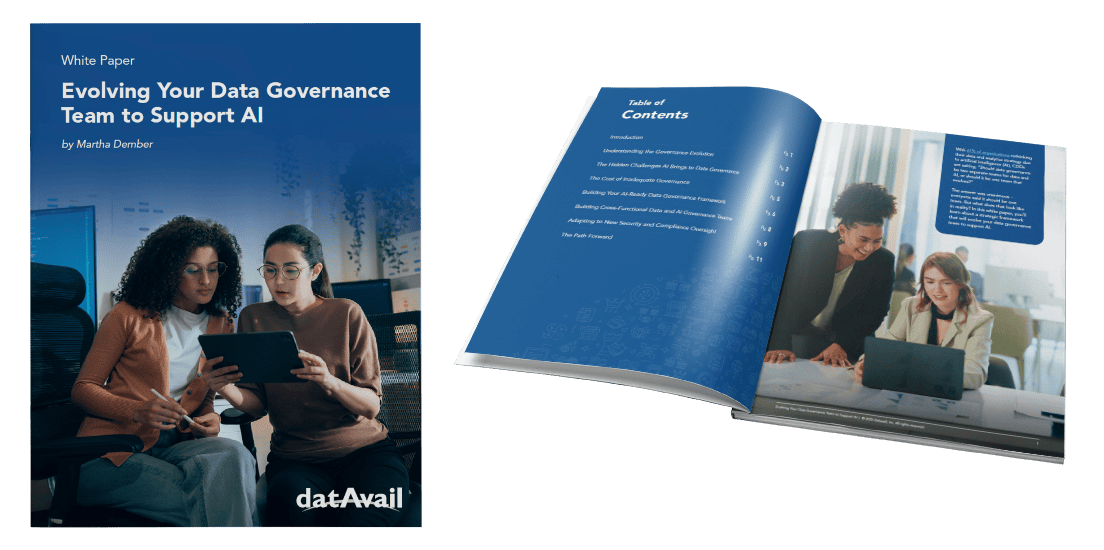Evolving Your Data Governance Team to Support AI

With 61% of organizations rethinking their data strategy because of AI, data leaders face a critical question: Should you build separate governance teams for data and AI, or evolve your existing team? This white paper provides the framework to transform your current data governance approach into an AI-ready competitive advantage without starting from scratch.
What You’ll Learn
- Proven strategies for evolving existing data governance teams to handle AI-specific challenges like prompt injection and model bias.
- Common governance pitfalls that cause 60% of organizations to fail at realizing AI value—and how to avoid them.
- Real-world frameworks for managing exponential data complexity while maintaining security and compliance.
- Cost-effective approaches to continuous monitoring and automated classification that scale with your AI initiatives.
- Expert perspectives on preparing for emerging regulatory requirements like the EU AI Act.
Key Insight from the White Paper
“The success of your AI use cases depends on proper data governance. Gartner predicts that 60% of organizations will fail to realize the value of their AI use cases due to lacking cohesive data governance frameworks.”
Organizations that treat AI governance as an extension of existing data governance—rather than a separate function—deploy AI systems faster, scale more effectively, and maintain stakeholder trust.
Fill out the form on this page to download the white paper and accelerate your AI governance strategy.
About the Author
Martha Dember, CDMP, is a founding practitioner of data governance. She assists companies at all levels of maturity to develop their data governance programs to achieve desired outcomes. Martha enjoys helping companies in developing business strategies where data is an integral part, along with CSF, data literacy programs, managing change, or even simply developing their communication plans around their data governance programs. She is there to advise on not just the “what” but also the “how” to get it done.
Frequently Asked Questions
What’s the difference between traditional data governance and AI governance?
Traditional data governance focuses on managing data as a static asset through quality controls, access rights, and compliance frameworks. AI governance shifts to governing how data gets used, with security as the foundation and policies designed around specific use cases. The key difference is moving from “Is this data accurate?” to “Is this the right use case, and do we understand the outcomes we’re looking for?”
How do you handle the exponential complexity growth that AI brings to data governance?
AI systems require continuous monitoring, unlike traditional systems with predictable data flows. Organizations must implement automated classification tools, real-time vulnerability detection, and continuous auditing that tracks data lineage and model performance. The focus shifts from periodic reviews to constant monitoring of business outcomes, customer satisfaction, and compliance posture.
What are the hidden security risks that AI introduces to data governance?
AI systems can leak sensitive information through seemingly innocent outputs, making detection nearly impossible without specialized monitoring. Unlike traditional data breaches where you can identify compromised records, AI introduces new attack vectors like prompt injections through unstandardized user interfaces. Organizations must implement safeguards that scrub sensitive data from input logs and deploy metadata labeling to flag sensitive data before it enters training pipelines.
How can organizations prepare for emerging AI regulations while maintaining operational flexibility?
Focus on building governance frameworks that extend existing data governance principles rather than replacing them entirely. Implement automated classification systems that tag data for AI readiness, establish clear escalation procedures for AI-related incidents, and create cross-functional teams with diverse expertise. This approach allows organizations to adapt quickly to new regulatory requirements like the EU AI Act while maintaining the flexibility needed for AI innovation.
Download the White Paper